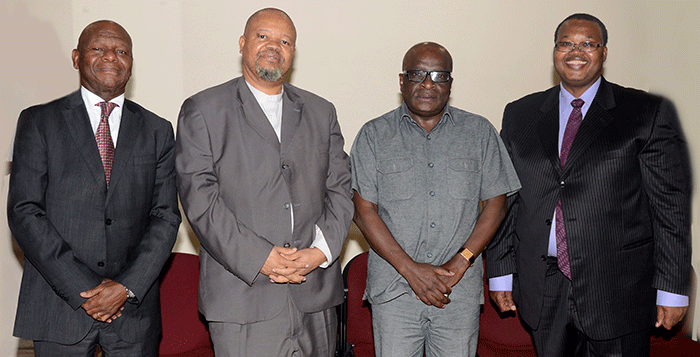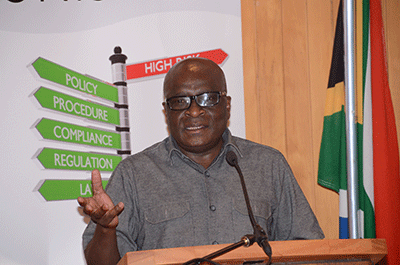
The largest provider of business education in Africa and one of the largest in the world
“In South Africa, we have a unique opportunity to build a new public administration that can contribute to the development of the field internationally. Transformation is therefore the very difficult process of building something better and, to this end, academic departments of public administration and schools of governance should play a prominent role,” said Advocate Ngoako Ramatlhodi, Minister for Public Service and Administration. He was speaking at a public lecture at Unisa on 23 March 2016.

Pictured at the public lecture by Unisa and the Public Service Commission: Judge Khayelihle Mthiyane (Chairperson of the Presidential Remuneration Review Commission), Prof Mandla Makhanya (Principal and Vice-Chancellor, Unisa), Advocate Ngoako Ramatlhodi (Minister for Public Service and Administration), and Advocate Richard Sizani (Chairperson of the Public Service Commission).
The joint public lecture by Unisa and Public Service Commission (PSC) was premised on building a capable, career-oriented and professional public service for a developmental state as stated in the National Development Plan (NDP): Vision 2030.

Advocate Ngoako Ramatlhodi (Minister for Public Service and Administration) pointed out that much has already been achieved in the effort to put a meritocratic, professional and career-oriented public service in place. “The first priority of the new government in 1994 was the rationalisation of the separate public services of the homelands and separate administrations for whites, coloureds and Indians into one public service and administration for South Africa. This was no mean feat,” he said
It’s been five years since the NDP: Vision for 2030 was established and it seems that many citizens neither clearly understand the NDP nor their own role in the development and advancement of good governance, which is key to the growth of democracy. In this regard the public lecture aimed to revisit the role that the NDP plays across all sectors of society and how it promotes good governance.
Ramatlhodi pointed out that much has already been achieved in the effort to put a meritocratic, professional and career-oriented public service in place. “The first priority of the new government in 1994 was the rationalisation of the separate public services of the homelands and separate administrations for whites, coloureds and Indians into one public service and administration for South Africa. This was no mean feat,” he said.
He also explained that the transformed public service had to make a radical shift in relation to providing services to all citizens of the country, not only provision of services, but also ensuring that the beneficiaries of these services were afforded the human dignity enshrined in section 1 of the Constitution.
In this regard, there were noticeable improvements in addressing socio-economic challenges. Access to sanitation has improved from 50% of households to 83%, access to water from 60% of households to 95%, and access to electricity from 50% to 86% of households. Government has provided approximately 2.8 million subsidised houses, 56% of which went to women-headed households. Primary school enrolment stood at 98% in 2012 and over 8 million learners are now benefiting from the no-fee schooling policy. This has increased secondary school enrolment from 51% in 1994 to an estimated 80% currently.
There is, however, much that still needs to be done in terms of promoting the constitutional values and principles governing public administration and stabilising the political administrative interface. Ramatlhodi would also like to see the public service becoming a career of choice. “The NDP recommended that the public service should become a career of choice. The NDP places skills and professionalism at the heart of the plan for improving the public service. This will require a shift from isolated training initiatives to a long-term approach that focuses on recruiting people with relevant aptitude and developing their skills over the course of their careers,” he explained.
It’s not surprising that Unisa is supporting these objectives as well as building state capacity. The year-old partnership between Unisa’s School of Governance, under Prof Harry Nengwekhulu, and the Public Service Commission under Advocate Richard Sizani, is a practical demonstration of joint efforts to join forces in building state capacity. The first group of students from the PSC have already been through an Advanced Applied Research programme here at Unisa. “It is always my conscious effort and strategy to foster these relationships between our knowledge institutions and public service practitioners in government for mutual benefit. This public lecture is a living demonstrable testimony that this partnership is working and promises to yield more benefits,” said Professor Mandla Makhanya, Principal and Vice-Chancellor at Unisa.
The Vice-Chancellor is grateful for platforms such as this one as it assures him that Unisa’s vision statement does not just dwell in the realm of abstract ideas but has a practical impactful contribution to society, to the continent, and to humanity at large.
*By Kirosha Naicker
Publish date: 2016-03-23 00:00:00.0